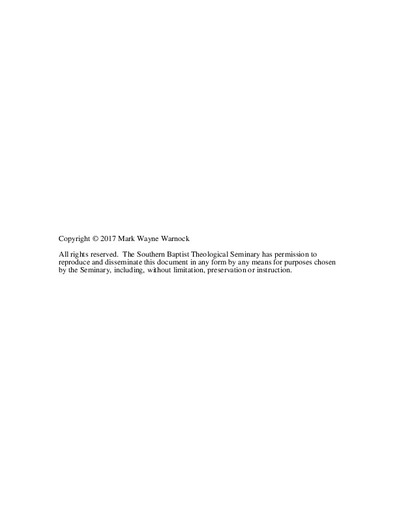A Critical Analysis of Mary Warnock's Argument for the Exclusion of Religious Arguments from Public Moral Discourse
Subject
Warnock, MaryReligion and politics
Abstract
ABSTRACT
A CRITICAL ANALYSIS OF MARY WARNOCK’S ARGUMENT
FOR THE EXCLUSION OF RELIGIOUS ARGUMENTS
FROM PUBLIC MORAL DISCOURSE
Mark Wayne Warnock, Ph.D.
The Southern Baptist Theological Seminary, 2017
Chair: Dr. Theodore J. Cabal
Mary Warnock, in her 2010 book Dishonest to God: On Keeping Religion out of Politics, argues for the exclusion of religious arguments from public moral discourse, contending that religious arguments resist moral change, illegitimately impose religious authority upon the public, and are often advanced in manipulative or dishonest ways. This dissertation analyzes and critiques her argument. Chapter 1 introduces Mary Warnock and shows how her argument relates to her philosophical work in imagination, morality, and religion.
Chapter 2 examines how Mary Warnock’s view of imagination undergirds key tenets of her views of morality and religion.
Chapter 3 critiques her view of the relationship between morality and law, and also her distinction between public and private morality.
Chapter 4 examines Warnock’s theologically liberal view of religion, which emphasizes the experiential and aesthetic and minimizes the doctrinal and moral.
Chapter 5 examines the first two of Warnock’s three objections to religious argument in the public sphere—that religious arguments resist moral change and impose religious authority upon the public.
Chapter 6 examines Warnock’s third objection—that religious arguments are advanced dishonestly in various ways.
Chapter 7 concludes the dissertation with an analysis of the state of religious arguments in the American legislative, cultural and jurisprudential context, and proposes an alternate but not new approach to religious arguments in public discourse.

